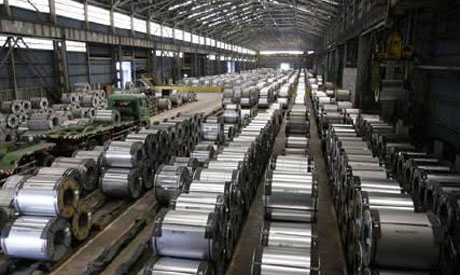Latest NEWS
- Aswat Masriya, the last word
- Roundup of Egypt's press headlines on March 15, 2017
- Roundup of Egypt's press headlines on March 14, 2017
- Former Egyptian President Hosni Mubarak to be released: lawyer
- Roundup of Egypt's press headlines on March 13, 2017
- Egypt's capital set to grow by half a million in 2017
- Egypt's wheat reserves to double with start of harvest -supply min
- Roundup of Egypt's press headlines on March 12, 2017
Government's new controls on imports stir controversy

A factory in Egypt - Reuters
Written by Mohamed Gad
CAIRO, Jan 4 (Aswat Masriya) - The ministry of industry's decision to impose restrictions on the imports to Egypt stirred a debate among importers with some are still studying it and others are opposed to it, seeing it is a protectionist policy that restricts the flow of foreign goods into Egypt.
The new system, which will be effective two months after its issuance in the official gazette on Dec. 31, sets conditions for approving the factories that may export to Egypt, featuring a long list of goods, from chocolate to motorcycles and air-conditioning equipment.
The head of the Importers Division at the Cairo Chamber of Commerce, Ahmed Shiha, told Aswat Masriya that the division requested a meeting with representatives of the ministries of finance and industry as well as the General Organisation for Export and Import Control to present to them its point of view on the decision, which he considered "contrary to the commitments of Egypt in international trade agreements" and GATT.
As per the ministry of industry’s decision, a registry at the General Organisation for Export and Import Control will be established to include the names of factories approved to export products, based on certain conditions. The factory must agree to be subjected to inspection by a technical team, which would "ensure that environmental and operational safety and health standards are met."
The decision includes eligibility standards regarding the legality of the importing entity's status, which entails having a license for the producer and the brand of its products, as well as the requirements relating to the circumstances of production, quality control, meeting environmental standards and abiding by the rules of the International Labour Organisation.
Shiha also said the new system would hinder the movement of imports and warned against its contribution to the promotion of monopolistic practices, especially in the goods that do not have local or low-cost alternatives, like motorcyles and steel rebar.
The new system covers a wide range of products including dairy products, oils and chocolate. The list also includes boilers, washing machines and air-conditioning equipment. It includes high-cost goods such as motorcycles and low-cost goods like clothing, shoes and textiles.
"The decision is consistent with Egypt's obligations in trade agreements", said Saeed Abdullah, the head of trade agreements at the ministry of industry and trade. "We have applied similar measures on clothing and textiles imported from Syria," he added.
Saeed said that the procedure is designed to regulate the market, not to obstruct importation. He said that global brand companies complain of brand imitation, these controls are in favour of Egypt and brand companies.
The value of imports that enter Egypt is more than double that of Egyptian exports. Imports reached $60.8 billion while exports reached $22 billion during 2014/2015.
Egypt’s president Abdel Fattah al-Sisi called on the government last year to cut down imports in order to alleviate the pressure on the country's foreign currency reserves.
(Translated into English by Menna Zaki)










